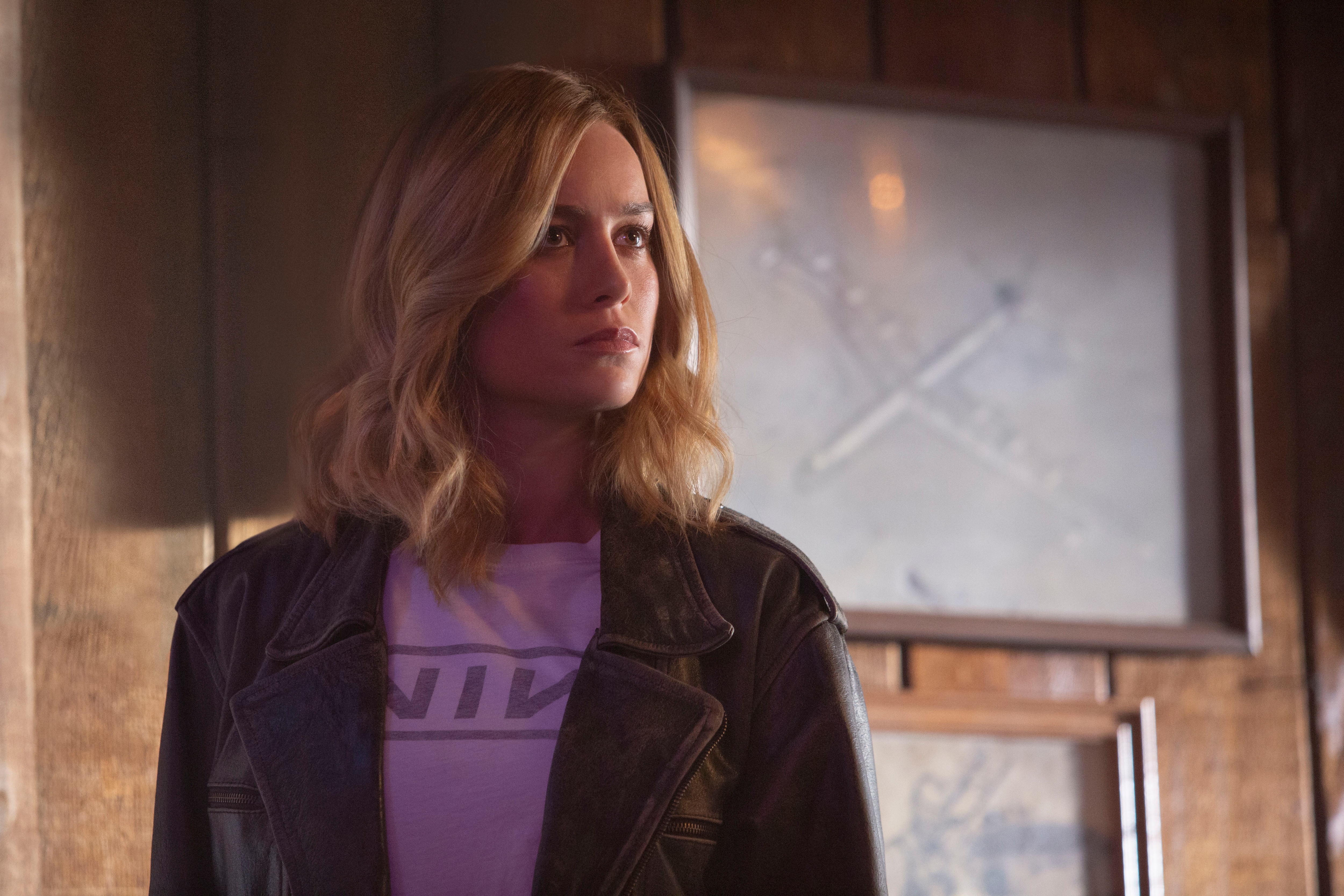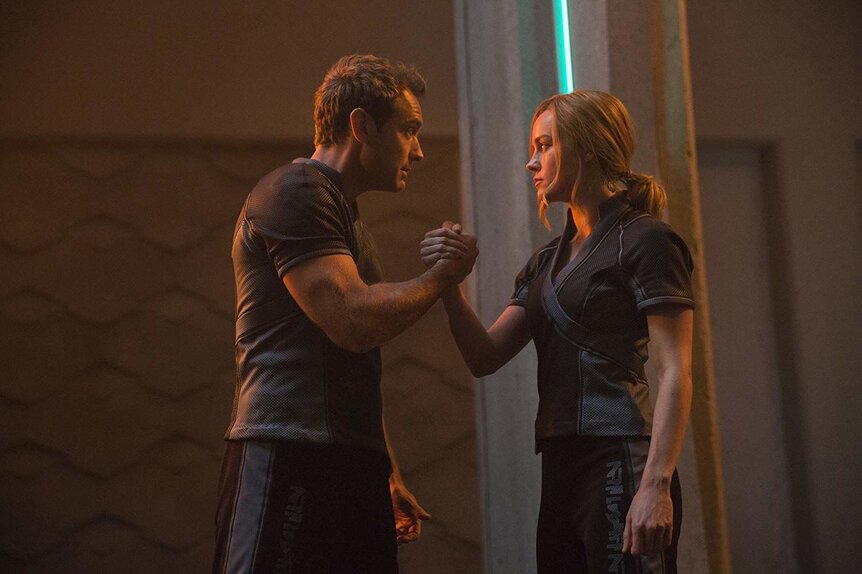Create a free profile to get unlimited access to exclusive videos, sweepstakes, and more!
Captain Marvel proves women need to stop fighting with one hand tied behind their back

For many superhero flicks, a fight scene is a climactic atom bomb bursting with CGI effects, logic-defying action, a sarcastic quip, a kick-ass soundtrack.
It infuses stakes into a story, it delivers on an unspoken promise that draws fans to theaters: yes, there will be violence, come and marvel at it. Rarely does a fight sequence serve a larger purpose, one beyond thrusting characters into world-shattering realities or introducing audiences to the glossed-over destruction caused by our heroes awe-inducing abilities.
But, if Captain Marvel has proven anything, it’s that when it comes to superhero movies, it’s anything but average.
The film sports a handful of technically-impressive action sequences. The first time we met Carol Danvers, known simply as "Vers" by her Kree counterparts, she’s sparring with an imposing instructor, Yon-Rogg (Jude Law). The scene is meant to give us a glimpse of Carol’s militaristic existence. She lives to battle bad guys. She yearns for a mission of her own, to be told she’s “ready” by her mentor’s standards. But when the end credits roll, when we’ve witnessed the epic journey of self-discovery Carol has gone on, that seemingly inconsequential fight scene takes on a greater meaning.
Carol, like so many women, is told repeatedly throughout the film that she must “fight fair.” And “fair,” in the case of the men she encounters both human and alien, means "void of emotion." When we see Carol square off against Yon-Rogg at the beginning of the movie, we’re led to believe that detachment is necessary for any Kree warrior. It’s how this race of people survive and thrive. Nobility, honor, these are the things that matter most. That might be true, but it’s also a guise for a more sinister reality, one in which a man in power tries to stifle the abilities of a woman by equating her emotions with something negative, something shameful.
For Carol, her powers are directly connected to her feelings. She’s able to blast Kree warships from the sky because of her love for people like Monica Rambeau (Lashana Lynch) and her mentor on Earth, Dr. Lawson (Annette Bening). She’s able to battle Skrulls with iron-encased fists thanks to her rage at their perceived injustice. She’s able to channel her emotions into a weapon, and that weapon scares the sh*t out of men.
That weapon isn’t the scarily powerful photon blasts that emit from her tightly-clenched fists; it’s the force behind them, the knowledge that she’s free to do as she pleases, that her potential isn’t defined by limitations put on her by the men around her. We see that most clearly in Carol’s final battle with Yon-Rogg, one in which he constantly belittles her choices, even remarking on the color of her suit at one point.
Yong-Rogg, like every abusive, controlling partner, attempts to emotionally manipulate Carol into denying a part of herself in order to make him feel more comfortable. He demands she battle him without her abilities, just fist-to-fist, believing her emotion-fueled powers serve as some kind of handicap. He hurls words like “noble” and “honor” to demean the source of Carol’s strength, to make it seem like something that must be dampened, not nourished. He challenges her to fight on his terms, to adhere to his rules so that he can hold on to some semblance of control.
And Carol, in a true act of indifferent dismissal, silences Yon-Rogg’s commands with a photon punch that leaves no doubt as to who’s in charge. She doesn’t try to reason with her former mentor, she doesn’t feel the need to answer his questions, to justify her actions. She simply blasts her way past his bullsh*t with a sly smirk and a bigger message.That bigger message might have been missed in the empowering, galactic firefight that ensues, but it’s one we can make use of in our everyday lives.
It’s no secret that men and women argue differently. Gendered stereotypes aside, men have been taught to protect their masculinity at all costs, which means things like emotions are foreign and apologies are seen as a defeat, the metaphorical waving of a white flag. Women enjoy reasoning through problems; they often see the bigger picture in disagreements, they’ve been taught to empathize (and worse) prioritize others’ feelings above their own — which is why it’s so easy for men like Yon-Rogg to discredit women by attacking their emotional intelligence.
I don’t recommend Googling “how men win arguments” if you’re not ready for the deluge of incel propaganda and blatant misogyny that follows. It’s … rough. But in reading through articles that promise to give “Tips For Winning A Fight With Your Crazy Girlfriend” or reveal “5 Tricks Girls Use To Win Arguments” it’s clear that, when it comes to confrontation, men see facing off against a woman as some kind of test of macho-ness. By viewing fights — both physical as in Yon-Rogg’s case with Carol, and verbal as with every woman’s experience with trolls online — as some contest to be won, men equate emotions as an unnecessary advantage in the war. Meninist heroes argue that, because men aren’t allowed to be physical with a woman — the natural progression of an argument that cannot be won definitively by either party, an underlying rule that keeps things civilized in our cave-man brains — they cannot win an argument. And when they’re thrown a curveball, like being forced to negotiate emotions, the futility of their resistance is made all the worse. Why?
Because fists solve things, while emotions just make them messier.
It’s a completely backward way of thinking in terms of gender — something Captain Marvel proves quite definitively. Carol is physically capable of winning a fight against Yon-Rogg sans abilities, but should she why deny a part of herself to appease her oppressor? Her emotions aren’t some advantage unique to her, she just embraces them and utilizes them in a way that feels foreign to someone who’s never been taught their value, who sees their existence as a sign of weakness.
But instead of giving into these type of men — and get out of our comments with #NotAllMen, because everyone could use a refresher course in this — how about we meet them with the same kind of give-no-f*cks-attitude Carol embodies?
Instead of engaging with trolls who demand we “debate them” in a form, a language, a medium they prefer, we just... don’t? I’d love to vaporize all the men who’ve insisted I “argue logically,” or “explain this,” or “justify my thinking” with and to them, but sadly, I lack the appropriate photon-blaster energy levels, so maybe it’s time to stop wasting energy on these men, period? Maybe, instead of defending our right to emotions that are integral and inherent to our species and gender, instead of meeting men on “their turf” by suffocating our own voices, we instead, like Carol, embrace our unique powers and unapologetically wield them to our benefit?
Maybe we stop answering for things to people who don’t deserve it.
Maybe, we finally stop fighting with one hand tied behind our backs?



























